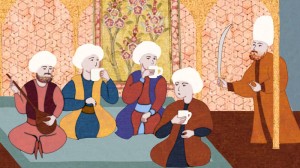Abyssinian goat herders may have been the first people to use the coffee bean for it’s psychoactive properties. The goat herders were likely to have observed their goats eating red berries off one particular tree, Cofea. After trying the berries themselves the goat herders experienced the psychoactive properties of the berries, and somewhere along the line they learned to roast the beans to make coffee.
Now, caffeine is the world’s most widely consumed psychoactive substance. And though it has become the world’s leading choice of stimulant, what happened before it achieved it’s popular status? Why was coffee banned with such force? and most importantly, who benefited the most from banning coffee?
Well coffee was actually heavily banned for a very long time, beginning over half a millenium ago in 1511. There were huge religious implications to this, and there aren’t any coffee haters from one particular religion, many faiths have had their fair share of coffee banning.
If I were to openly drink coffee during the ban: Mecca 1511 I would have been subject to severe social stigma. In Italy during the 16th century the pope would have called me Satanic. And (my favorite) Constantinople in 1623 Sultan Murad IV would have personally beheaded me (or tossed me in a river).
The Sultan Murad IV was born in July 27, 1612. He was able to end lawlessness in his land as well as successfully conquer of Bagdad, two wonderful feats. But he also would disguise himself and roam the streets looking for a criminal coffee-drinkers to chop down with his hundred pound broadsword. When he realized that method wan’t sustainable he resorted to sewing the perpetrator in a leather bag then tossing the bag into a river.
(The Sultan also had a horrible drug habit that involved copious amounts of alcohol. His addiction to alcohol was the cause of his death, ironic considering his tyrannical ban on coffee).
The ban on coffee was almost 300 years long and expanded to the Arabic Penninsula, Africa, Italy, and the Americas. But why was this historical War on Beans such a long battle?
The first theory that answers why it was so hard to legalize coffee can be found in the SAGE Encyclopedia of Alcohol: Social, Cultural, and Historical Perspectives. that the war on coffee makes a lot of profit for big corporations.
The truth is, privatizing and legalizing other drugs (such as alcohol) made large organizations a lot of money. By creating a monopoly power on psychoactive substances weal were able to maintain their power and privilege. “[wealthy] elites dependent on alcohol production and trade to retain power and privilege, developed independently of many ancient cultures; they often used their wealth and influence to promote state policies favorable to their economic interests in trading commoditized alcohol”. (SAGE encyclopedia linked above, 147).
The second theory comes from Micheal Pollan supports the encyclopedia’s claim. Although Pollan’s study is about botany and human relationships with plants, he also acknowledges that throughout the historical use of plant-based-drugs humans have always fell into the pattern of favoring one drug and, for no natural reason, prohibiting the use of another.
In recent years we may have fallen prey to the same drug-of-choice attitude. 2014 marked a time when alcohol manufacturers, beer breweries, and tobacco industries fought against marijuana legalization. However, in 2016 we can see changes in the industry, particularly within BIg Tobacco; it’s cited as having been interested in marijuana as both a complementary and rival product since 1970 and is just beginning to act on its interests.
With deep pockets suddenly becoming interested in the marijuana industry, we can expect huge transformations not only in the industry itself but within the cultural perception of marijuana as well. After all, the War on Weed has only been waged for 100 years, compared to the historical 400 year religious/political war on coffee.
And in other news, finally, someone banned these damn un-recyclable K-cups. and an expert tells us a but about why we should pay attention to North Korea..

